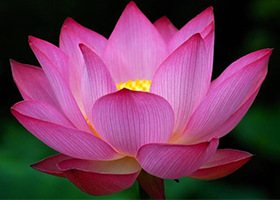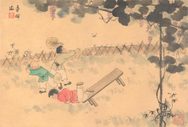Art and Culture
Art | Music | Poetry | Literature | Culture | New Science | Ancient Cultivation Stories
-
Stories from Ancient China: Integrity is Worth the Most
2006-05-04 The next day, a group of merchants came to his shop to buy some cloth. Mr. Tao Siwong did not dye any cloth with the fake purple grass, and burnt all of the fake grass in front of the merchants. He said, "I'd rather lose money than sacrifice others' benefit."
The next day, a group of merchants came to his shop to buy some cloth. Mr. Tao Siwong did not dye any cloth with the fake purple grass, and burnt all of the fake grass in front of the merchants. He said, "I'd rather lose money than sacrifice others' benefit." -
Poem: Can The World... ?
2006-05-03 Sowing seeds of the most bitter fruitsuch fields of shame and despair.As the branches wither under a coldest wintercan the world find its conscience to care?
Sowing seeds of the most bitter fruitsuch fields of shame and despair.As the branches wither under a coldest wintercan the world find its conscience to care? -
Poem: Heart of Hearts
2006-05-02 From the holiest of holiesfrom fire and our heart of heartsa seed that bears flower beyond blossomwhen our final hour from this world departs.
From the holiest of holiesfrom fire and our heart of heartsa seed that bears flower beyond blossomwhen our final hour from this world departs. -
Stories from Ancient China: Have We Really Achieved Tolerance and Generosity of Spirit?
2006-05-01 Su Shi was so upset that his face was blue and he immediately hired a boat to cross to the other side of the river to argue with Master Foyin. When he got to the opposite bank, he saw that the door of Master Foyin's temple was tightly closed. He guessed that Master Foyin must have been scared away. When he walked up to the closed temple door, he saw a small note. He went closer to read the note that said, "Didn't you say you aren't moved by the eight winds? Why did you jump across the river with flatulence in the wind!?"
Su Shi was so upset that his face was blue and he immediately hired a boat to cross to the other side of the river to argue with Master Foyin. When he got to the opposite bank, he saw that the door of Master Foyin's temple was tightly closed. He guessed that Master Foyin must have been scared away. When he walked up to the closed temple door, he saw a small note. He went closer to read the note that said, "Didn't you say you aren't moved by the eight winds? Why did you jump across the river with flatulence in the wind!?" -
Poem: From Precious Seed
2006-04-30 From precious seedbearing weave of flameworlds unto worlds becomingreturning to origins unnamed.Laboured long of life unfoldingtime and striving againupon silent tides ebb and slowlands where clouds descend.
From precious seedbearing weave of flameworlds unto worlds becomingreturning to origins unnamed.Laboured long of life unfoldingtime and striving againupon silent tides ebb and slowlands where clouds descend. -
Painting: Relentless
2006-04-28 This is a scene from a Chinese detention center, where prison guards are given directives to "transform" people who practice Falun Gong; that is, force them to renounce their beliefs. When brainwashing classes do not work, practitioners are subjected to relentless beating and torture, sometimes unto death.
This is a scene from a Chinese detention center, where prison guards are given directives to "transform" people who practice Falun Gong; that is, force them to renounce their beliefs. When brainwashing classes do not work, practitioners are subjected to relentless beating and torture, sometimes unto death. -
A Short Story -- Realm in a Jar
2006-04-27 Whenever he chanted an incantation, there would be a realm displayed inside his jar with a sun, a moon, stars, a blue sky, earth, mountains, woods and grasslands, flowers, temples and houses, etc. Even more mysterious was that every night, Zhang Shen would put his jar on the floor, and slip into the jar to sleep after chanting incantations to enjoy his deity realm. He called his realm inside the jar the "Jar Heaven." Thus, people called him the "Jar Gentleman."
Whenever he chanted an incantation, there would be a realm displayed inside his jar with a sun, a moon, stars, a blue sky, earth, mountains, woods and grasslands, flowers, temples and houses, etc. Even more mysterious was that every night, Zhang Shen would put his jar on the floor, and slip into the jar to sleep after chanting incantations to enjoy his deity realm. He called his realm inside the jar the "Jar Heaven." Thus, people called him the "Jar Gentleman." -
Stories from Ancient China: Jiang Xinkui Teaches a Heavenly Principle Via the Death of His Son
2006-04-26 Several months later, the Jiang family planned to build a garden. The son went to the mountain with others to collect stones for the garden when suddenly a large rock fell on him, killing him instantly. Jiang Xinhui was heartbroken. Then someone told him about how his son had accepted the bribe secretly. Jiang gradually got over his grief. He decided not to hide what his son had done and instead let people talk about it openly.
Several months later, the Jiang family planned to build a garden. The son went to the mountain with others to collect stones for the garden when suddenly a large rock fell on him, killing him instantly. Jiang Xinhui was heartbroken. Then someone told him about how his son had accepted the bribe secretly. Jiang gradually got over his grief. He decided not to hide what his son had done and instead let people talk about it openly. -
Stories from Ancient China: Short Term Loss Leads to Long Term Gain
2006-04-25 Zeng immediately said, "I had originally planned to do the same thing. But I heard that a famine has just broken out in the north. If the clay-ware pieces are transported to the north, it might be difficult to sell them there. Therefore I cancelled my trip." That person immediately backed out of the deal and left with the money that he had planned to pay Zeng for the clay-ware. Because he couldn't sell the clay-ware, Zeng's entire family soon fell into a destitute situation with no food and no way to keep warm.
Zeng immediately said, "I had originally planned to do the same thing. But I heard that a famine has just broken out in the north. If the clay-ware pieces are transported to the north, it might be difficult to sell them there. Therefore I cancelled my trip." That person immediately backed out of the deal and left with the money that he had planned to pay Zeng for the clay-ware. Because he couldn't sell the clay-ware, Zeng's entire family soon fell into a destitute situation with no food and no way to keep warm. -
Stories from Ancient China: Heart of Greed Abandoned, Heart of Virtue Kept
2006-04-24 The businessman thanked Lin Ji on his knees after he went to Beijing Guandao School, and with tears in his eyes told Lin Ji the whole story. Lin Ji asked him to tell exactly how many pearls were in the fabric pouch. Mr. Zhang answered correctly. Lin Ji then knew that it was his and gave it back to him. Mr. Zhang was so grateful that he offered to take only half of the pearls back for his family. Lin Ji said, "If I truly wanted to have half of your pearls, I would not have put up posters along the road asking you to look for me." Mr. Zhang insisted on giving him half, but Lin Ji firmly refused.
The businessman thanked Lin Ji on his knees after he went to Beijing Guandao School, and with tears in his eyes told Lin Ji the whole story. Lin Ji asked him to tell exactly how many pearls were in the fabric pouch. Mr. Zhang answered correctly. Lin Ji then knew that it was his and gave it back to him. Mr. Zhang was so grateful that he offered to take only half of the pearls back for his family. Lin Ji said, "If I truly wanted to have half of your pearls, I would not have put up posters along the road asking you to look for me." Mr. Zhang insisted on giving him half, but Lin Ji firmly refused. -
Stories from Ancient China: Afraid Not that Others Know, But that I Know
2006-04-23 "Not afraid that others may know, but that I know" is the spirit of self-control. It tells people that one can control and behave oneself by following certain rules. In traditional Chinese culture people stress "not to misbehave in a dark room," meaning that even though nobody would know about it if we did a wrong deed, we should still follow our moral standards. People who believe in gods and heaven know that our every thought and every move are being watched.
"Not afraid that others may know, but that I know" is the spirit of self-control. It tells people that one can control and behave oneself by following certain rules. In traditional Chinese culture people stress "not to misbehave in a dark room," meaning that even though nobody would know about it if we did a wrong deed, we should still follow our moral standards. People who believe in gods and heaven know that our every thought and every move are being watched. -
Painting: The Seventh Eve
2006-04-22
-
Stories from Ancient China: Do Not Pursue or Indulge in Vanity
2006-04-21 Qi Jingtong scolded Qi Jiguang seriously for his extravagant and ostentatious idea. He cautioned Qi Jiguang, "If you pursue and indulge yourself in vanity, you won't be able to achieve great things when you grow up." Qi Jiguang accepted his father's criticism and told the artisan to install only four carved doors.
Qi Jingtong scolded Qi Jiguang seriously for his extravagant and ostentatious idea. He cautioned Qi Jiguang, "If you pursue and indulge yourself in vanity, you won't be able to achieve great things when you grow up." Qi Jiguang accepted his father's criticism and told the artisan to install only four carved doors. -
Poem: Spring
2006-04-20 Winter, forlorn and fadingin the turning of tide and Springwith many a lotus near to bloomwhat perennial light it must bring.
Winter, forlorn and fadingin the turning of tide and Springwith many a lotus near to bloomwhat perennial light it must bring. -
Traditional Culture: Do Not Pursue or Indulge in Vanity
2006-04-19 With this teaching, discipline from his father as well as learning from his father's exemplary conduct, Qi Jiguang sought no extravagance and felt content with moderate food. He was diligent and earnest in his studies and practice of martial arts. Later, he became a famous general as well as an outstanding strategist of the Ming Dynasty, and fought against the invading minorities. He therefore had his name imprinted in Chinese history. He had learned that flaunting, indulgence, attachment to one's own appearance, acquiring wealth, achievements and status - these attachments aim at seeking other people's flattery and praise, and are all manifestations of vanity.
With this teaching, discipline from his father as well as learning from his father's exemplary conduct, Qi Jiguang sought no extravagance and felt content with moderate food. He was diligent and earnest in his studies and practice of martial arts. Later, he became a famous general as well as an outstanding strategist of the Ming Dynasty, and fought against the invading minorities. He therefore had his name imprinted in Chinese history. He had learned that flaunting, indulgence, attachment to one's own appearance, acquiring wealth, achievements and status - these attachments aim at seeking other people's flattery and praise, and are all manifestations of vanity.



 more ...
more ...